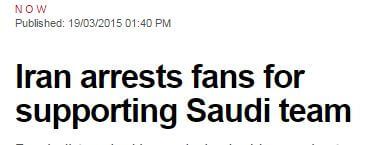Today’s Top Stories
1. Wall St. Journal: US to re-evaluate its Mideast peace strategy. Click via Google News. Meanwhile, anonymous US officials told the New York Times that the White House may back a UN resolution on Palestine, or at least withhold a veto. When dealing with anonymous sources, news consumers must handle with care.
Although the principles are United States policy, until now officials would never have endorsed them in the United Nations because the action would have been seen as too antagonistic to Israel.
“The premise of our position internationally has been to support direct negotiations between the Israelis and the Palestinians,” a senior White House official said. “We are now in a reality where the Israeli government no longer supports direct negotiations. Therefore we clearly have to factor that into our decisions going forward.”
More follow up at Foreign Policy.
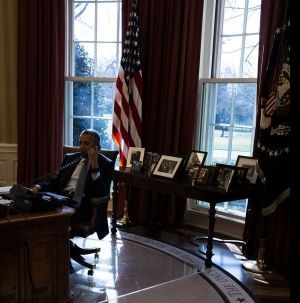
2. In his first post-election interview, Isaac Herzog ruled out joining a national unity government.
3. Big Media weighs in on the election. See below for all the commentary/analysis.
4. ABC News Hands Jerusalem Bureau Keys to an Advocacy Journalist: Sophie McNeill has a history of pro-Palestinian advocacy journalism.
5. No Palestinian Elections? So Delegitimize Israeli Democracy: A Palestinian attacks Israeli democracy, ignoring that Palestinians are denied the vote by their own leaders.
6. A New York Times Editorial Bashes Israeli Democracy: The New York Times describes the Israeli election as “ugly” following Benjamin Netanyahu’s victory.
7. The Pathetic Whine Over an Israeli Food Ad: BDS supporters claim Israeli food ad designed “to distract the public from its military occupation.”
Election Aftermath
• In his first post-election interview (with Andrea Mitchell of NBC News), Prime Minister Netanyahu backed off his opposition to a Palestinian state and reiterated that he meant no disrespect to President Obama with his Congress speech. The full interview was due to be aired after this roundup went to press.
• There were a changes in the final Knesset numbers after the absentee ballots were counted. Here’s a by the numbers look at the 2015 election based on YNet.
5,878,362: Israelis eligible to vote
4,253,336: ballots cast
72.3 percent: voter participation
43,869: disqualified votes
3.25 percent: minimum votes needed for a party to make the Knesset
136,808: the actual number of votes needed to make the above threshold
191,577: votes for parties that didn’t make the threshold
33,482: number of votes equaling one Knesset seat
4: seats assigned to parties based on vote sharing agreements
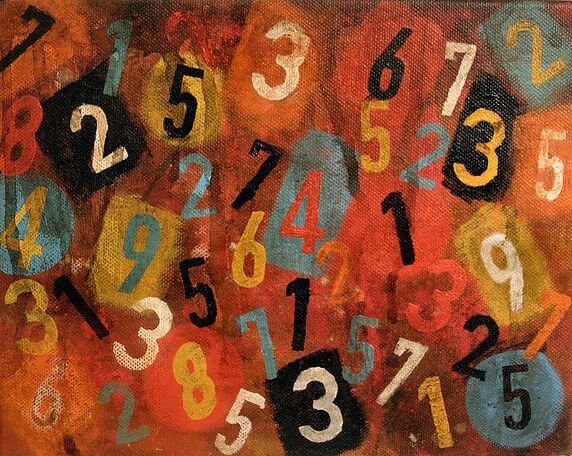
• In case anyone still cares about it, John Kerry congratulated Netanyahu on his re-election. And State Department spokeswoman Jen Psaki made a point of telling reporters that Netanyahu’s win will have no impact on the Iranian talks.
• I liked YNet‘s easy to understand piece on how a government is formed the next steps in coalition-building process. President Reuven Rivlin is scheduled to meet with party representatives on Sunday.
• James Taranto nails New York Times’s election coverage. See the Wall St. Journal via Google News.
• Who really won Israel’s elections? It might well have been Israeli Arabs
• Does this mean no congratulatory phone call from Erdogan?
Israel and the Palestinians
• Court upholds Seattle Metro’s ban on bus ads about the Israeli-Palestinian conflict.
“Municipalities faced with the prospect of having to accept virtually all political speech if they accept any — regardless of the level of disruption caused — will simply close the forum to political speech altogether,” said Watford, an appointee of President Obama’s.
• Palestinian college exhibition glorifies terror, as intended.
The exhibition, which ran for a week and was put together by students, included 25 pieces. Among them, there were pieces glorifying vehicular attacks on Israelis (similar to the attacks that actually took place in October and November), pictures of the al-Aqsa Mosque and the Dome of the Rock, and a poster of Israeli activist Yitzchak Glick as a shooting target . . .
According to the official Facebook page of the Hamas Student Association, “the message of the exhibition is to justify all attacks as a reaction from Hamas supporters and followers against settlers in Jerusalem ensuring that if Israel keeps to the same policy of neglect and racism against Muslims in Jerusalem, Hamas fighters will be ready to act.”
Around the World
• Iran jealously protects its home-field advantage with “mass arrests.”
• Jeffrey Goldberg sparked a heckuva conversation with a massive piece in The Atlantic asking if it’s time for Jews to leave Europe. More than 5,600 comments posted.
• The University of Kent banned an extremist preacher who expressed anti-Semitic and homophobic views.
• Josh Glancy describes Manchester’s anti-Semitism and “new Jewish ghetto” at Tablet.
• The Vanderbilt University community and fraternities condemned swastika graffiti on campus.
Commentary/Analysis
• Eli Lake: Bibi’s pre-elections comments didn’t bait out of the peace process. The context of what he said is being overlooked.
Asked in an interview with the right-leaning website NRG if there was any chance for a Palestinian state under another Netanyahu government, he declared there was none.
Lots of journalists and analysts saw it as a reversal of the prime minister’s speech in 2009 at Bar Ilan University, in which he laid out his vision for a demilitarized Palestinian nation. But the context here is important. Netanyahu prefaced his answer by stating something very obvious: “I think that anyone who is going to establish a Palestinian state today and evacuate lands is giving attack grounds to the radical Islam against the state of Israel.”
This was not fear-mongering. It was something Israelis have been grappling with for a decade.
For anyone who wants to watch the original interview in Hebrew, here ya go.
• Israel will be in for a lot of diplomatic pressure, but Raphael Ahren predicts the sky won’t fall.
• What do the election results mean for Jewish communities abroad? Sam Sokol wonders if tensions among US Jews will be exacerbated. Louise Scodie worries that some people in the UK will see the results as an excuse for anti-Semitism. Last but not least, Peter Beinart wants to remind us all that Diaspora Jews have a right to resist the new government.
• What about the Palestinian vote? Evelyn Gordon nails it:
And anyone who actually cares about the peace process ought to be far more worried by the Palestinian election that didn’t happen than by the outcome of the Israeli one that did.
• How do you understand this take by the Charlotte Observer‘s Kevin Siers?
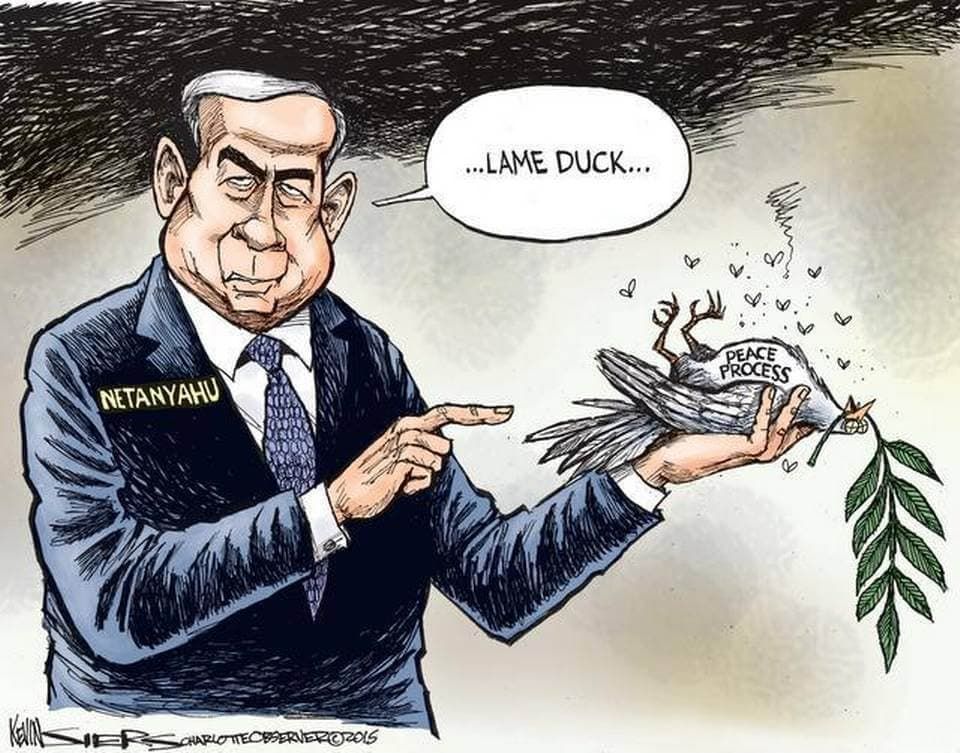
• Lot more post-election commentary/analysis.
– Jonathan Tobin: US should “re-evaluate” peace process
– Amos Harel: Results prove security is the issue on Election Day
– Elliott Abrams: Obama buries the hatchet — in Netanyahu’s head
– Haviv Rettig Gur: After electoral trouncing, what future for the Israeli left?
– Spengler: Israeli election a referendum on two-state solution
– Bernard Avishai: Netanyahu’s compromised victory
– Eitan Haber: Israeli left is living in a bubble
– Dan Perry: Why Israelis chose Netanyahu; not just nationalism
– Tom Friedman: Bibi, father of the one-state solution
– Danny Rubinstein: The new Palestinian hope
– Dov Zakheim: Why pundits got the Israeli election so wrong
– Rebecca Shimoni Stoil: After Netanyahu win, Obama takes off the gloves
– Frida Ghitis: How Obama handed Netanyahu victory
• Steve Sack of the Minneapolis Star-Tribune weighed in.
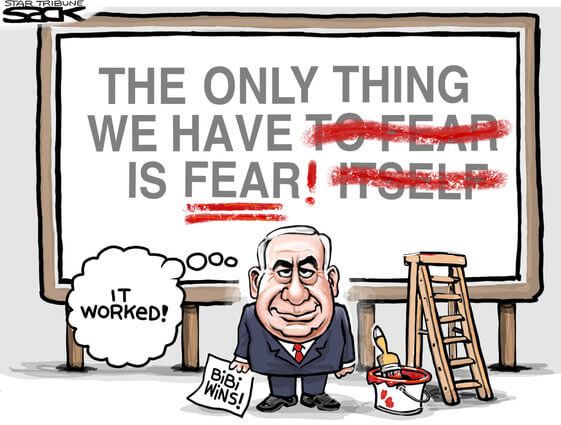
• Quite a few papers weighed in with staff-eds:
– Washington Post: Who loses as Netanyahu wins?
– Times of London: Myopia in Israel
– The Guardian: A risky path for Israel
– Irish Times: Israel steps back to the future
– Wall St. Journal: Netanyahu’s victory (click via Google News).
– Financial Times: Bibi’s triumph, and the challenge for Obama (click via Google News)
• And how are Palestinians and their supporters spinning the election results? Daoud Kuttab, Yousef Munayyer, Hussein ibish, and Sir Vincent Fean weigh in.
• Last word on the election aftermath goes to the Columbus Dispatch‘s Nate Beeler.
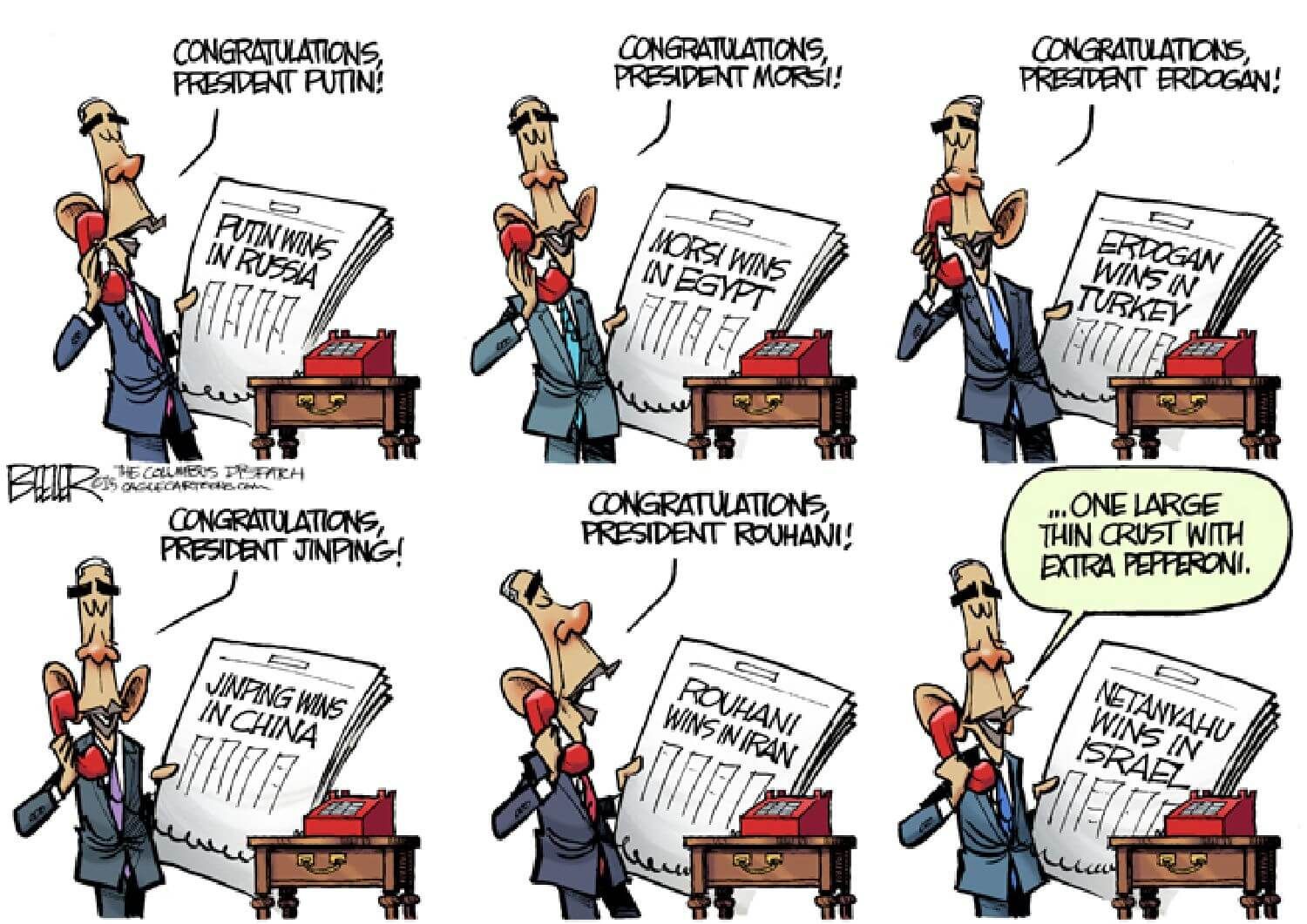
• For more commentary/analysis on other issues, see John Bolton (UN vote irrelevant to Iran deal), and David Goldman (White House missteps crown Iran as regional hegemon).
Featured image: CC BY Pedro Ribeiro Simo?es via flickr with modifications by HonestReporting; Obama via White House web site; numbers CC BY-NC-ND flickr/Heather aka Molly;
For more, see yesterday’s Israel Daily News Stream and join the IDNS on Facebook.


